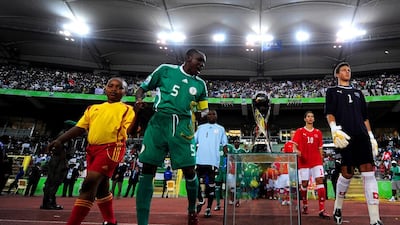Abuchi Obinwa, already a footballer of considerable renown, could have been one of the stars of this month’s Fifa Under 17 World Cup.
Equally adept at centre-back or at the base of midfield, the youngster had excelled at the age-group level for the United States and further polished his reputation during a week-long, summer stint at Real Madrid’s academy.
However, he sought to represent Nigeria instead – Obinwa qualified through his parents – excited to contribute to their quest to be crowned world champions in the UAE. He would be a history-maker, part of Nigeria’s unprecedented fourth U17 world title.
Obinwa, though, has not travelled to the Emirates. In July, the same month he impressed at Madrid, a magnetic resonance imaging (MRI) scan deemed he was too old to compete in U17 football, despite the player producing documentation to prove otherwise.
While nothing suggests Obinwa deliberately conspired to deceive, his case is not unique.
Since its implementation by Fifa in 2009, there have been numerous instances of failed age tests, and given the fiercely competitive nature of age-group international football, the majority are treated with suspicion. African sides, in particular, have been flagged as repeat offenders.
“Age cheating has become a cancer to African football,” an Egyptian FA official was quoted as saying by several Africa media sources ahead of the 2009 U17 World Cup.
“Countries like Nigeria, Ghana and Cameroon were fond of fielding overage players in international youth tournaments. Age cheating is destroying football development in Africa.”
The list is as long as it is lamentable. In 2003, Kenya’s government dissolved their national U17 team when players admitted they were over age.
Six years later, as Nigeria prepared to host the U17 World Cup, they dropped 15 members of their squad following testing. In the aftermath, a former Nigerian international claimed in a newspaper column that Fortune Chukwudi, then the side’s captain, was 25 years old.
Soon after came confirmation that Gambia omitted 11 of the 18 players who had helped them triumph at the African U17 Championship a few months previously.
The continental competition is a particular casualty. When the Confederation of African Football (CAF) last year ordered all countries involved in qualifying to undergo testing, 10 players from Ghana’s U17s were found to be too old. On the eve of the tournament in April, nine players – three each from Nigeria, Republic of Congo and Ivory Coast – were excluded from participating.
“Many, if not all African countries ‘cheat’ with the age of their youth players,” Arnold Pannenborg, a Dutch journalist and respected commentator on African football, has noted. “We don’t have to pretend it doesn’t happen, because, really, it does. And a lot, too”.
The corroborative evidence is striking. Take the U17 World Cup, where Africa constitutes the most successful continental zone, having been represented in 10 finals, winning five. As three-time victors and with a trio of runner-up finishes, Nigeria are the tournament’s most dominant team, yet considerable achievement at the age-group level has never been replicated by the senior side on the world stage.
Accusations that Nigeria included more than the permitted three overage players when they struck gold in the 1996 Summer Olympics were thought to have been validated when the full side failed to make any real indent at the two successive World Cups. They had been penalised before, banned by Fifa for two years from all international fixtures, because of disparities in three players’ birth dates. Those who have shone at age-group level, such as Phillip Osondu, voted the best player at the 1987 U17 World Cup, have seldom thrived in senior football. Granted, a number of factors contribute to the discrepancy, although the dubious authenticity of age-group success has always found significant voice.
“Using overage players for age-group competitions is one of the major reasons why football has not fully developed in the country,” said Friday Ekpo, a former Nigerian national team player.
“It has done a lot of harm to our football and the image of our country at international level.
“You expect a good player that is truly 17 years of age to move to the U21s and the senior team in either three or four years’ time, but that has not been the case. When you expect to see them at senior level, they fade away because they have falsified their ages at one point in time.”
The reasons for fabricating ages are many, both institutional and individual. Some countries do not have the infrastructure; birth certificates are often not available, or can be easily forged.
Age cheating accelerated with the commercialisation of its football, particularly in Africa. With European clubs increasingly searching for young talent, players are encouraged to alter their age to magnify their appeal.
Also, some federations seem more willing to attempt to skirt the rules. The practice is not solely restricted to football, either.
Typically, the beautiful game offers an escape route from poverty; a gateway to a better quality of life.
“African players feel the need to cheat because they didn’t have early opportunities like the Europeans,” said Jay-Jay Okocha, one of the continent’s most celebrated exports.
Whatever the cause, the consequences can be far-reaching.
By wrongfully taking a squad place, others are denied the opportunity to represent their national team, and a country’s long-term development can be stunted.
The advent of MRI age-testing has highlighted the issue and decreased its prevalence, yet it requires proper enforcement.
Rumblings remain, too, regarding its reliability.
Its capacity to judge ages with 99 per cent certainty leaves room for error, and perhaps offers explanation, if little comfort, to cases such as Obinwa.
jmcauley@thenational.ae


